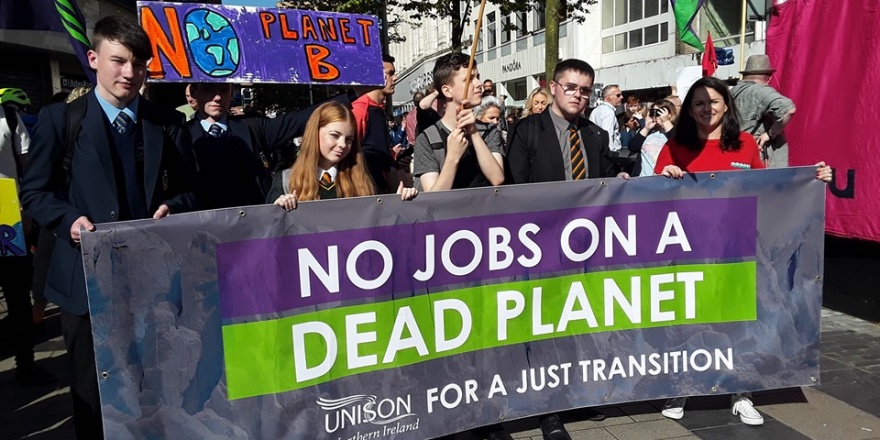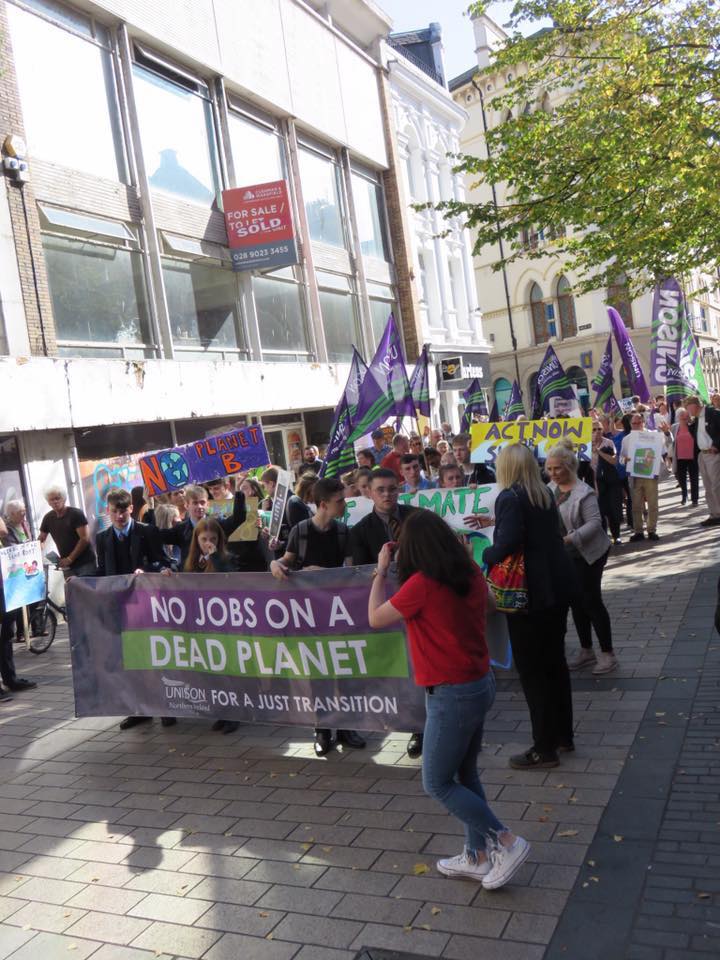
Green UNISON is a new campaign calling on employers across the public sector to decarbonise public services. Members and activists have a crucial role to play in greening our public services and ensuring a just transition to a low carbon and sustainable economy.
What does 'just transition' mean?
Because of climate breakdown, the 21st century is witnessing the greatest economic transition ever experienced.The Intergovernmental Panel on Climate Change (IPCC) is clear that if global warming is to be kept below
1.5-2° C, climate neutrality must be achieved by 2050 at the very latest. Reducing greenhouse gas emissions is a top priority in achieving this objective.
The "just transition" framework describes a series of adaptation principles designed to protect workers against the worst effects of climate breakdown.
A zero-carbon world is possible, but we have choices about how this transition is managed. A just transition "ensures environmental sustainability, as well as decent work, social inclusion and poverty eradication" (OECD, 2017). The term 'just transition' is increasingly being used by many organising networks, grassroots groups, unions and environmental organisations.
Employment, income, wealth distribution, purchasing power, gender equity and measures to tackle poverty must be placed at the centre of all discussions around just transition.
Why is a just transition important for public services?
The transition to a zero-carbon economy is especially urgent, and many people incorrectly believe that this transition mostly concerns the energy sector. However, ignoring the care sector - including health and social care, childcare and education - would mean excluding a significant and growing part of the world of labour. Green energy transitions in public services drive important changes in energy and manufacturing. If the concept of just transition has poverty eradication and social justice at its core, it is essential
to include health, education and our wider public services, which are integral to the social welfare state.
The consequences of climate change will continue to impact on health and safety in the public service workforce. Primary effects include heat exhaustion and fatigue, chronic obstructive pulmonary disease, coronary artery disease, diabetes mellitus and chronic kidney disease. Secondary effects include increases in allergic disorders among workers and a broadening of the range of disease vectors, such as ticks and mosquitoes (ETUC, 2020). These health risks will impact on working conditions, and are exacerbated by high humidity, low air convection, wearing personal protective equipment, inadequate break conditions and working during the hottest hours of the day.
Workers will also be impacted by employment precarity. Job losses due to the impact of climate change have spill-over effects on the entire economy; damage is not limited to the most impacted economic sectors. In 2014, it was estimated that 240,000 jobs in the EU would be lost by 2020 and 410,000 by 2050 if adequate adaptation measures are not adopted. The highest number of job losses will likely occur in manufacturing and public utilities, retail and leisure, with around 100,000 job losses for both sectors by 2050. However, there are also predicted 90,000 job losses across public services in the EU (Triple E Consulting, 2014).
The European Trade Union Confederation (ETUC) identify public services as a "sector at risk", citing the likelihood of natural disasters to put pressure on the emergency and rescue services, and the healthcare sector in particular.
As the climate changes, the risks posed to human health will grow more severe. This will put additional pressure on a sector already impacted by budget cuts, repeated underfunding, low wages, poor working conditions and staff shortages.
What should be done?
UNISON recently published a new report called ‘Getting to net zero in UK public services: The road to decarbonisation’.
The report has three key findings:
- The government needs to start funding public service decarbonisation now. This requires an estimated capital investment of £140bn up to 2035, where at least £122bn should be provided by central UK government;
- The UK government must set up a separate and significant additional climate and decarbonisation budget, funded by Whitehall. Otherwise, public services will find it difficult to meet their climate duties and net zero targets; and
- The government must set up a social partnership and dialogue with trade unions in public service decarbonisation.
Northern Ireland finally has its own climate legislation in the form of the Climate Change Act, which has recently successfully passed through the Assembly.
The Act sets a net zero carbon emissions target for 2050, with a separate reduction target of 46% for methane emissions. The new legislation requires departments to develop and publish sectoral plans setting out how sectors will contribute to achieving the targets in the Act. There is also a requirement for financial, social, economic and rural impact assessments to be carried out on the effects of climate proposals and policies.
The Department for Agriculture, Environment and Rural Affairs must set and adhere to carbon budgets. A Just Transition Commission will also be established to oversee the just transition elements of the Act and provide advice to departments, and an independent Climate Commissioner must also be appointed.
How can I get involved?
- Get your workplace to declare a climate emergency
- Engage with your employer on green/sustainability issues
- Ask your employer to set up a green budget
- Find out five things your employer is doing to green the workplace
- Look at how you can work with your employer to reach a net zero target
- Hold a climate change branch meeting

Sign up to our Green UNISON NI mailing list for campaign updates and to hear about more opportunities to get involved!
Useful Resources
- Road to decarbonisation report (UNISON)
- Green bargaining and negotiating in the workplace - the role of the environment rep (UNISON)
- Key measures needed to deliver a just transition (ICTU)
- Response to Climate Change (No. 2) Bill (UNISON NI)
- Cutting carbon, growing skills - green skills for a just transition (TUC/Unionlearn)
- The gender dimensions of the climate crisis and the European green deal (European Public Service Union)
- Guidelines for a just transition towards environmentally sustainable economies and societies for all (International Labour Organization)
- Supporting People and Place: Planning for a Just Transition in Northern Ireland (Nevin Economic Research Institute)
- Video: A just transition explained (Institute for Public Policy Research)
- Video: UNISON’s Report Launch: Greening UK Public Services (UNISON Scotland)
- Podcast: What is a just transition and how do we achieve it? (Royal Society of Edinburgh)



